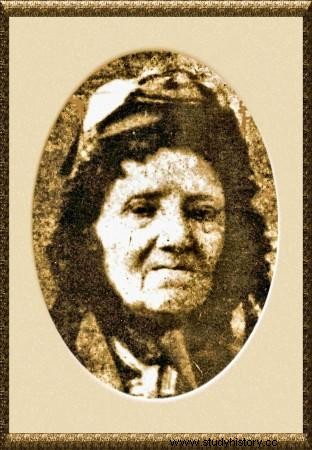A feminist and socialist activist, Jeanne Deroin (1805 – 1894) made headlines in 1849 by presenting herself as a candidate in the legislative elections, at a time when women were neither voters nor eligible.
The subjugation of women
 Jeanne Deroin was born on December 31, 1805 in Paris in a modest environment. She first worked as a laundry worker before deciding to pass the teacher's certificate, for which she trained as an autodidact. A first failure does not discourage her, and she obtains her patent.
Jeanne Deroin was born on December 31, 1805 in Paris in a modest environment. She first worked as a laundry worker before deciding to pass the teacher's certificate, for which she trained as an autodidact. A first failure does not discourage her, and she obtains her patent.
A critical Saint-Simonian, Jeanne adheres to the idea that industrial progress brings about a change in society, allowing in particular to free human beings from the alienation of work. She is involved in improving the status of women and, at age 26, wrote a plea in which she questions:"If there are some differences in the organization of the two sexes, can these differences motivate the female subjugation? “
In 1832, Jeanne married Antoine Ulysse Desroches in a civil ceremony, and refused to take his name. They will have three children.
The Second Republic
When the French Revolution of 1848 broke out and the Second Republic was proclaimed, Jeanne Deroin became involved among others and became known as a women's rights activist. The right to vote is restored for men of French nationality over 21, and Jeanne is the first to add "masculine" to the expression universal suffrage; she questions and thereby criticizes the exclusion of women from the right to vote.
In June, Jeanne founded with the feminist and socialist activist Désirée Gay, like her from a working class background, the newspaper La Politique des Femmes which will become The Opinion of Women . She is involved in the Society for the Voice of Women and the Society for the Emancipation of Women.
Candidate for the legislative elections
In April 1849, Jeanne Deroin rose to prominence by declaring herself a candidate in the legislative elections, when women were neither voters nor eligible. Aware that her candidacy cannot succeed, she sees the elections as an opportunity to express her ideas and speak out. Criticizing the inequalities between women and men in politics, Jeanne's campaign strikes even in her camp.
"You sincerely want all the consequences of your great principles Liberty, Equality, Fraternity, it is in the name of these principles which do not admit unjust exclusion that I present myself as a candidate for the Legislative Assembly"
"A very serious fact"
Jeanne Deroin is very isolated in this action. If she receives rare marks of support and testimonies of sympathy or even admiration, she undergoes many mockeries and insults. Many intellectuals, even in his camp, opposed his candidacy, such as George Sand or Marie d'Agoult. About Jeanne's candidacy, Pierre-Joseph Proudhon writes, in the daily newspaper Le Peuple April 12, 1849:
“A very serious event, about which it is impossible for us to remain silent, happened at a recent socialist banquet. A woman seriously applied for the National Assembly. We cannot let pass, without protesting energetically, in the name of public morality and of justice itself, such pretensions and such principles. It is important that socialism does not accept its solidarity. The political equality of the two sexes, that is to say the assimilation of women to men in public functions, is one of the sophisms that not only logic rejects but also human conscience and the nature of things. . »
Jeanne will not be elected, not having the legal possibility. After the December 1851 coup, she went into exile in England. She died there in poverty in April 1894.
